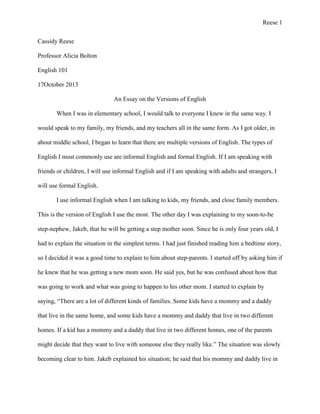
Narrative essay
- 1. Reese 1 Cassidy Reese Professor Alicia Bolton English 101 17October 2013 An Essay on the Versions of English When I was in elementary school, I would talk to everyone I knew in the same way. I would speak to my family, my friends, and my teachers all in the same form. As I got older, in about middle school, I began to learn that there are multiple versions of English. The types of English I most commonly use are informal English and formal English. If I am speaking with friends or children, I will use informal English and if I am speaking with adults and strangers, I will use formal English. I use informal English when I am talking to kids, my friends, and close family members. This is the version of English I use the most. The other day I was explaining to my soon-to-be step-nephew, Jakeb, that he will be getting a step mother soon. Since he is only four years old, I had to explain the situation in the simplest terms. I had just finished reading him a bedtime story, so I decided it was a good time to explain to him about step-parents. I started off by asking him if he knew that he was getting a new mom soon. He said yes, but he was confused about how that was going to work and what was going to happen to his other mom. I started to explain by saying, “There are a lot of different kinds of families. Some kids have a mommy and a daddy that live in the same home, and some kids have a mommy and daddy that live in two different homes. If a kid has a mommy and a daddy that live in two different homes, one of the parents might decide that they want to live with someone else they really like.” The situation was slowly becoming clear to him. Jakeb explained his situation; he said that his mommy and daddy live in
- 2. Reese 2 two different homes. I continued explaining by saying, “Once one of the parents decide that they want to live with someone they really like, they will get married and begin their life together with you. This new, extra parent will be called a step-parent.” Surprisingly, he understood exactly what I was trying to get across. I had to use this informal, simplified version of English in order to explain the situation to a four year old. If I was explaining second marriage to a middle school child, I could simply say that their mom or dad is getting married, and they would know that they will soon have a step parent. I also use informal English when I am talking with my friends and close family members. I have two older sisters, so we use a lot of informal English when we talk to one another. We greet each other by saying things like, “Hey sista!” or “Wassup sis?” Obviously, I would not use this form of English when talking to a complete stranger or a professor. Another way I use informal English is by using puns when I text. A little while ago, I was texting my sister about looking for wedding dresses. We were having some trouble getting started, and we were not sure where to look. She texted me saying, “I’m glad we started looking for dresses meow instead of later.” So I replied, “You started looking at the puuurrrrfect time.” “Shore did. Owl let you know what I find. I’m shore you want to come sea the dresses with me” she said. “You are berry correct! I would lava too.” I replied. She said, “You are giraffing me crazy with these puns.” I ended it by saying, “You are such a beach. I am sick of you and your tearable puns.” Needless to say, this is another strong example of informal English. The other version of English I most commonly use is formal English. I use this version when talking with strangers, professors, and most of the older generations. I speak to them with a
- 3. Reese 3 more polite manner. I use the terms “ma’am” and “sir” more frequently when speaking to professors and older generations. When speaking to them, I would be more likely to say “Hello, how are you?” rather than saying, “ayewassup man?” like I would with friends. The other day, I was at the gas station and I locked my keys and phone in the car. I was frustrated with myself when I had to go into the gas station and ask to borrow their phone so I could call the American Automobile Association. As angry as I was, I used formal English when talking to the AAA operator, because she was a stranger. I spoke more clear and polite and I often used the terms “ma’am” and “thank you.” I speak with that version of formal English to most adults in general. There are many more versions of English, and we use them daily. Informal, formal, and slang are just a few examples. We switch over versions without even acknowledging that we have done so. As we get older, we find more and more versions of English, and we find out the appropriate times to use them.